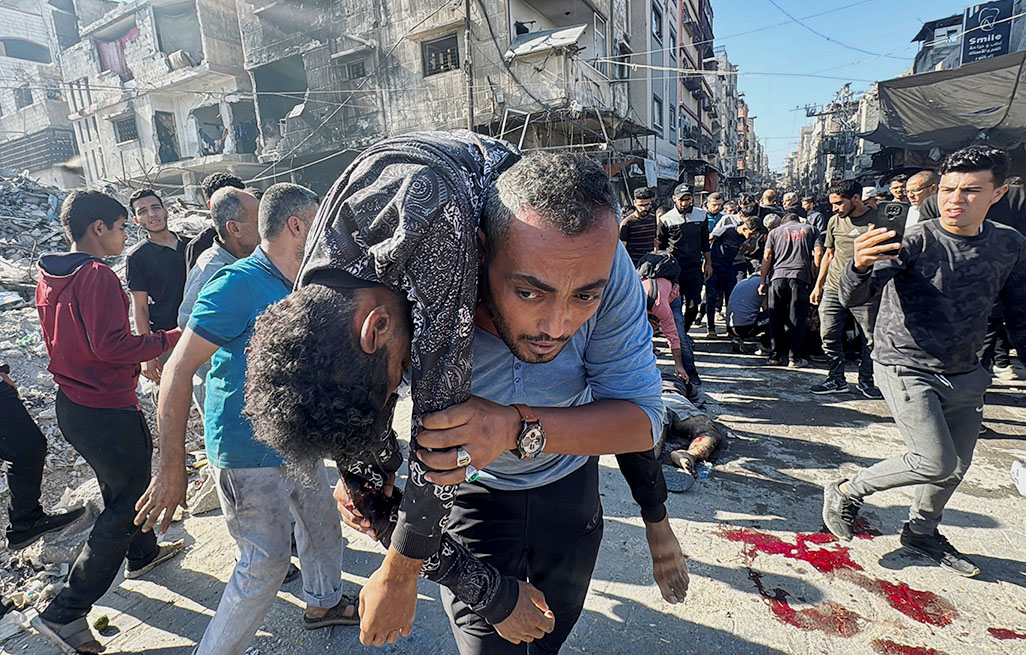Prospects of a ceasefire between Israel and its foes Hamas and Hezbollah ran aground on Friday as Israeli airstrikes killed at least 64 people in the Gaza Strip, according to medics in the Palestinian enclave, and battered Beirut’s southern suburbs.
U.S. envoys had been working to secure ceasefires on both fronts ahead of the U.S. presidential election next Tuesday.
But Hamas did not favour a temporary truce, its Al-Aqsa Hamas television reported on Friday. The ceasefire proposals failed to meet its conditions that any deal must end the year-long war in Gaza and include a withdrawal of Israeli forces from there, it said.
Earlier, Israeli Prime Minister Benjamin Netanyahu said his priority was to enforce security “despite any pressure or constraints”.
His office said he relayed this message to U.S. envoys Amos Hochstein and Brett McGurk in Israel on Thursday. Israel meanwhile pressed on with its military offensives against Hamas in the Gaza Strip and Hezbollah in Lebanon on Friday.
Medics in Gaza said about 64 people were killed and dozens more injured overnight and into Friday morning in Israeli strikes on the city of Deir Al-Balah, the Nuseirat camp and the town of Al-Zawayda, all in the central area of Gaza as well as in its south.
Fourteen people were killed by an Israeli strike at the gate of a school sheltering displaced Palestinians in Nuseirat, according to medics at the camp’s Al-Awda Hospital. Another 10 were killed in a car in Khan Younis in the south of Gaza, medics said.
The Israeli military said its troops had killed what it called armed terrorists in central Gaza and the northern Jabalia area. It had no immediate comment on the reported school strike, although it habitually denies deliberately attacking civilians.
Israel also pummelled Beirut’s southern suburbs on Friday morning with at least 10 strikes, Reuters journalists said. It was the first bombardment on the area – once a densely-packed district and Hezbollah stronghold – in nearly a week.
The strikes came after Israel issued evacuation orders for 10 separate neighbourhoods.
Hassan Saad, speaking in a street in Lebanon’s capital Beirut, told Reuters: “This is a brutal war and Israel does not have the right to do this…There must be a limit put for Israel because it does not abide by any of the laws or human morality.”
Another Beirut man, Ali Ramadan, said he believed the Israeli airstrikes were a way to put pressure on Lebanon in the ceasefire negotiations.
The hostilities have whittled away any hope a truce could be reached before the Nov. 5 U.S. presidential election.
Hamas television, quoting a leading source in the group, said the ceasefire proposals did not meet its conditions.
“The proposals do not include a permanent cessation of aggression, withdrawal of occupation forces from the Gaza Strip, or the return of displaced people,” the source said.
Nor did they address Palestinians’ need for security, relief and reconstruction, and the full reopening of border crossings, the source said.
The delegation also demanded the provision of food, medicine and shelter, and said any agreement must include an exchange of Palestinians held in Israel’s jails for the Israeli hostages captive in Gaza.
Israel’s Netanyahu, addressing graduating troops on Thursday, said: “Agreements, documents, proposals are not the main point.
“The main point is our ability and determination to enforce security, thwart attacks against us and act against the arming of our enemies, as necessary and despite any pressure and constraints. This is the main point,” he said.
‘ISRAELI STUBBORNNESS’
Lebanon’s caretaker prime minister Najib Mikati on Friday accused Israel of blocking any progress in the negotiations.
“Israeli statements and diplomatic signals received by Lebanon confirm the Israeli stubbornness in rejecting the proposed solutions and insisting on the approach of killing and destruction,” he said.
Israel on Thursday also bombed the Baalbek region in Lebanon’s east, home to UNESCO-listed Roman ruins. A cultural group that organises yearly festivals amid the ruins said some cracks were visible due to nearby Israeli strikes.
Hezbollah began firing rockets at Israel in solidarity with Palestinians a day after Hamas-led militants attacked Israel on Oct. 7, 2023, killing some 1,200 people and taking 251 hostages back to Gaza, according to Israeli tallies.
Israel’s retaliatory offensives have killed more than 43,000 Palestinians and reduced most of Gaza to rubble, Palestinian authorities say, and also killed around 2,800 people in Lebanon, according to the health ministry there.
In northern Israel close to the Lebanese border, a farmer and four Thai workers were killed in a Hezbollah rocket attack on Metula on Thursday, Israeli authorities said. Two more civilians were killed by shrapnel near the town of Kiryat Ata, further south near the port city of Haifa.
The Iran-backed Hezbollah says it only fires at military targets in Israel.







Click here to change your cookie preferences